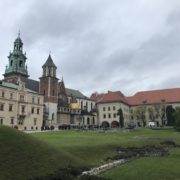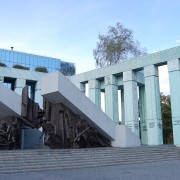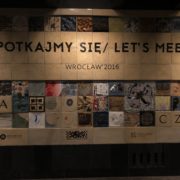A Major Identity Crisis
By Rosa Beyk
Nelson Mandela once said, “No one is born hating another person because of the colour of his skin, or his background or his religion. People learn to hate, and if they can learn to hate, they can be taught to love, for love comes more naturally to the human heart than its opposite.” This has been a quote that I have lived my life by, always believing that in a world full of hate, there is also love. During my stay thus far in Poland, as well as traveling to other eastern European countries, I have learned so many things that have opened my eyes to the world around me. With my past experience of racism in the United States, I looked forward to coming to this side of the world in hopes of discovering a more unified and accepting nation. Unfortunately even here, I experienced racism and because of the topic of our study program, I had to process racism and discrimination across geopolitical and historical contexts. I have realized that racism is not one sided and it isn’t only between white people and people of color. Racism can occur between anyone of any color, background, religion, ethnicity, sexuality, and much more. It is the failure and current standing of what I like to refer to by the term, coined by the psychologist Erik Erikson, ‘Identity Crisis’. By this I do not solely mean a time period in which there is confusion with a person’s sense of identity, but more a conflict between identities. One that makes people justify that their identity is superior compared to others. In my view, this is the key to understanding why racism exists, not only in Poland and the United States, but also all over the world.
The fundamental strategy to understanding why racism exists in a certain area is to understand the history as well as the people that live there. Poland is a country with a very complicated history because of the many partitions, after which Poland ceased to exist; the Nazi and Soviet occupations in WWII, which ended a brief period of independence between the First World War. After which Poland was then a Communist nation where life was largely dictated by the Soviet Union. Only approximately two and a half decades ago, Poland was able to break away from the Communist rule, allowing Poles a chance to regain their independence. However, if we trace their history back a bit further we can examine the time period of when Poland was under German and Soviet occupation, during World War II. During this time period, Poles suffered discrimination in their own state. According to the Holocaust Teacher Resource Center, “Nazi ideology viewed ‘Poles’-the predominantly Roman Catholic ethnic majority- as ‘sub-humans’ occupying lands vital to Germany.” Hitler claimed that the need for military expansion was due to the fact that they needed more living space for the German nation claiming that:
I have issued the command and I’ll have anybody who utters but one word of criticism executed by firing squad-that our war aim does not consist in reaching certain lines, but in the physical destruction of the enemy. Accordingly, I have placed my death-head formations in readiness—for the present only in the East— with orders to send to death mercilessly and without compassion, men, women, and children of Polish derivation and language. Only thus shall we gain the living space that we need.
This can help one understand what Poles went through during such times. Of course there were many other horrible things being done under the Nazi regime however to understand why such racism occurs here now we have to understand the racism that was upon them in those times as well.
Czeslaw Miłosz claimed, in his piece called ‘Native Realm A Search for Self-Definition’, that “unless we can relate it to ourselves personally, history will always be more or less of an abstraction, and its content the clash of impersonal forces and ideas.” I do believe that Poland’s history is a clash of impersonal forces and ideas due to the population changes and the definitions of who exactly is inhabiting ‘Poland”. In the Potsdam Conference of 1945, the German-Polish frontier moved 150 miles to the west, which changed the forced resettlement of both Poles and Germans. After World War II, 4.5 million Poles settled in the former German territories. Joanna Konopińska, a Polish student explained her thoughts of moving into a former German house claiming, “stumbling at every turn onto things that belong to someone else…I can’t imagine that I will ever be able to say: This is my house.” We can see the conflicting ties between what was Polish territory or what was German or even part of the former Soviet Union due to the fact that Poland was partitioned so many times and even ceased to exist from the time period of 1796-1919.
The question I always asked myself was, ‘How did racism in Poland come to be if they have had a history of racism and neglect upon their own race and country?” In an article called, ‘Understanding Modern Racism in Poland”, an unknown blogger attempts to explain his experience being in Poland as an Asian man. He claimed that when he addressed the general public about racism in Poland, most replies involved the denial of any racism at all. He claimed that there is a new kind of racism, “that has replaced it is this denial that it is happening and sweeping any evidence of racism under the carpet, dismissing it as no more than innocent ‘cultural misunderstandings’”.
So why is such a topic such as racism swept under the rug in Poland. There can be many reasons, one being that 96.9% of the population identifies themselves as Polish. The next ethnic group is Silesian at 1.1%. In terms of religion, approximately 87.2% of Poles identify themselves as the Catholic. Therefore, one can conclude that if any racism does exist it would be against the 3.1% that live in Poland, or against other people that live in surrounding countries. However for a topic such as racism to be addressed, there needs to be some sort of movement that allows for this discussion. With such a large portion of the population identifying themselves as Polish, it can be understood why there are such ethnic and racial prejudices. A sense of superiority due to historical factors, as well as the fear of people they know little about, and the longing to blame other countries for their inadequacies.
The conflict of identity often acts as road blocks to a more unified nation.. Poland’s lack of diversity and unwillingness to bring out such an issue makes it tough to even address. Poland, however, it not the only country like this. Many countries with a majority white population have this problem of superiority and the failure to recognize other cultures as equal to your own. This comes down to the root of racism. Are we willing to push out identities aside and create an inclusive world in which everyone is equal? This is the question that needs to be answered in order to diminish racism.
Resources
(n.d.). Retrieved from (http://www.holocaust-trc.org/poles/)
(n.d.). Retrieved from http://www.armenian-genocide.org/hitler.html








